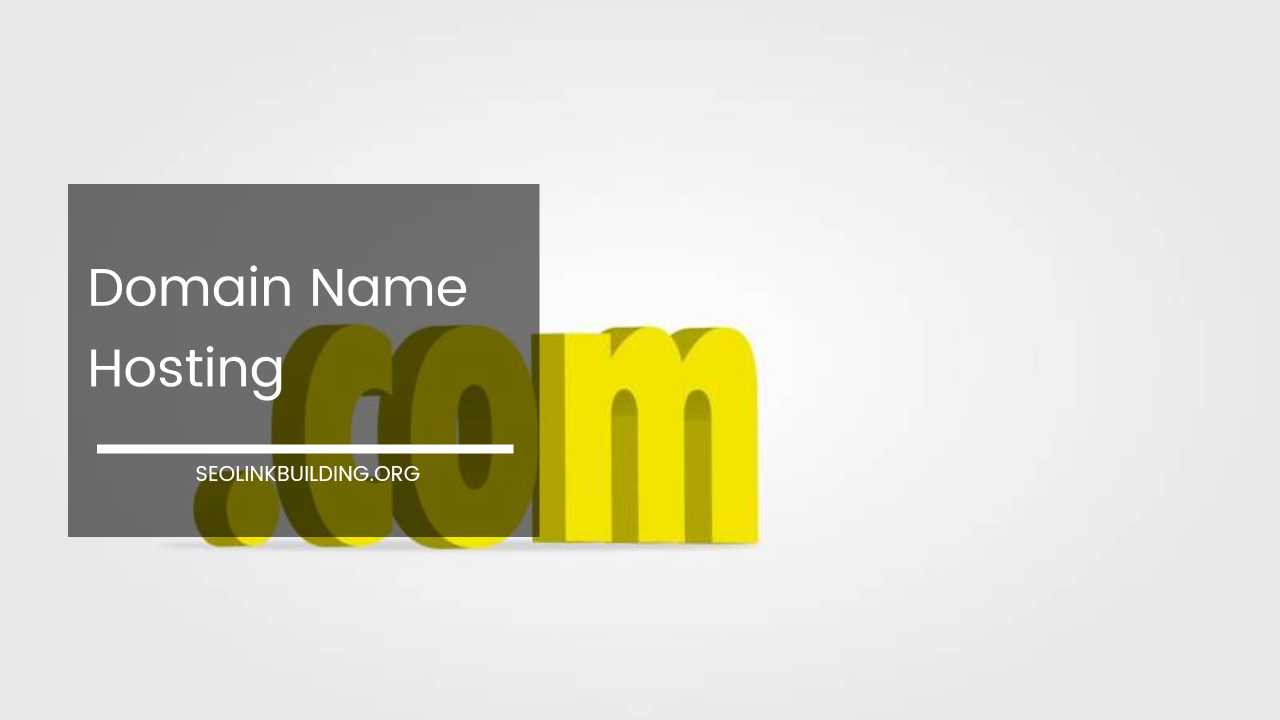The Ultimate Guide to Domain Name Hosting

Mastering Your Digital Dwelling: A Comprehensive Guide to Domain Name Hosting
In today’s digitally driven world, establishing an online presence is no longer a fad; it’s a cornerstone of success. Whether you’re a budding entrepreneur, a seasoned professional, or a passionate hobbyist with a story to share, creating a website empowers you to carve your niche in the vast digital landscape.
But before you embark on the exciting journey of website design and development, there are two foundational pillars you need to secure: your domain name and website hosting.
This comprehensive guide dives deep into the realm of domain name hosting, equipping you with the knowledge to make informed decisions and navigate the process with confidence.
Demystifying Domain Names: Your Website’s Address on the Web
Imagine your domain name as your website’s unique address on the internet. It’s the name people type into their web browsers to find your digital haven. Think of “google.com” – that’s Google’s domain name, instantly recognizable and synonymous with the search engine giant.
Let’s dissect the key components that make up a domain name:
- Second-Level Domain (SLD): This is the most recognizable part of your domain name, typically reflecting your business name, brand name, or a relevant keyword that encapsulates your website’s essence. For instance, in “https://www.amazon.com/“, “amazon” is the SLD.
- Top-Level Domain (TLD): This is the suffix that follows the SLD, such as the ubiquitous .com, the non-profit oriented .org, or the technology-centric .net. There’s a vast array of TLDs available, each with its own purpose and connotation.
Choosing the Right Domain Name: A Balancing Act
Selecting the perfect domain name is a crucial first step. Here are some key considerations to guide you:
- Brandability is King: Your domain name should be memorable, easy to spell and pronounce, and seamlessly align with your brand identity. Imagine a bakery – “https://www.sweettooth.kitchen/” is catchy, relevant, and easy to remember, compared to something generic like “https://www.bakery23.com/“.
- Keyword Integration: While not mandatory, incorporating relevant keywords into your domain name can enhance your website’s search engine optimization (SEO). This can make it easier for people to discover your website through search engines like Google.
- Length Matters: Shorter domain names are generally better. They’re easier to remember, type, and share verbally. Aim for conciseness while still capturing the essence of your website.
- Availability is Key: Don’t set your heart on a specific name only to discover it’s already taken. Many domain registrars offer user-friendly domain name search tools to help you check availability and explore alternatives.
Exploring the TLD Landscape: A World Beyond .com
The traditional .com reigns supreme as the most popular and widely recognized TLD. It’s a safe bet for businesses and general websites. However, the world of TLDs extends far beyond .com, offering a diverse range of options to cater to specific needs:
- .org: This TLD is often associated with non-profit organizations, educational institutions, and foundations. It evokes a sense of credibility and trust for websites with a social or educational mission.
- .net: Originally intended for technology and internet-related businesses, .net has evolved to encompass a wider range of websites. It’s a good choice if .com isn’t available or if you want to convey a focus on technology or the internet.
- .info: This TLD is well-suited for websites that primarily provide informational content, such as news websites, educational resources, or online dictionaries.
- Country-Specific TLDs: These TLDs, like .in for India or .co.uk for the United Kingdom, allow you to target a specific geographic location with your website. They can be particularly useful if you have a local business or cater to a specific region.
Understanding Website Hosting: The Foundation of Your Online Presence
Website hosting refers to the service that stores your website’s files and makes them accessible to visitors on the internet. It’s the essential infrastructure that houses your website’s content, just like a physical space stores your belongings. Imagine a bustling online store – the website hosting service provides the secure and reliable storage for all the product information, images, and customer data, ensuring smooth operation for your online business.
Types of Website Hosting: Choosing the Right Fit
There’s no one-size-fits-all solution when it comes to website hosting. Different types of hosting cater to varying needs and technical expertise:
-
Shared Hosting: The most budget-friendly option, shared hosting essentially rents out space on a server that also houses other websites. It’s a good starting point for beginners with low-traffic websites, such as personal blogs or small portfolios. However, resources like processing power and bandwidth are shared, so performance can be impacted if other websites on the server experience surges in traffic.
-
Virtual Private Server (VPS) Hosting: Offering a step up from shared hosting, VPS hosting provides a virtualized environment within a physical server. This virtual environment acts like a dedicated server, offering greater control over resources like CPU, RAM, and storage. VPS hosting is ideal for websites experiencing moderate traffic or requiring more customization than shared hosting allows. Think of it as having your own designated apartment within a larger building, with more control over your space and amenities.
-
Dedicated Hosting: For websites with high-traffic volumes and demanding performance requirements, dedicated hosting offers the ultimate solution. Here, you essentially lease an entire physical server, giving you complete control over all its resources and configuration. This translates to superior performance, security, and customization options. Dedicated hosting is ideal for large e-commerce platforms, high-traffic news websites, or mission-critical applications. Imagine owning your own independent house – you have complete control over everything and can tailor it to your specific needs.
Beyond the Basics: Advanced Hosting Considerations
As your website grows and evolves, you might encounter hosting needs beyond the core types mentioned above. Here’s a glimpse into some specialized hosting options:
-
Cloud Hosting: This type of hosting leverages a network of servers, offering scalability and flexibility. Resources can be easily scaled up or down based on your website’s traffic demands. Cloud hosting is a popular choice for websites with fluctuating traffic patterns or those anticipating significant growth.
-
Managed WordPress Hosting: If you’re building your website on the popular WordPress platform, managed WordPress hosting simplifies the process. This type of hosting takes care of server maintenance, security updates, and WordPress-specific optimizations, allowing you to focus on creating compelling content and managing your website.
Choosing the Right Hosting Plan: Decoding the Jargon
With a plethora of hosting plans available, navigating the options can seem daunting. Here are some key factors to consider when selecting the perfect plan for your website:
- Traffic Volume: Estimate the number of visitors you expect your website to receive monthly. Shared hosting might suffice for low-traffic websites, while dedicated hosting becomes more relevant for high-traffic sites.
- Disk Space and Bandwidth: These determine the amount of storage your website needs for its content (text, images, videos) and the amount of data transfer it requires to function smoothly. Consider your website’s content type and expected traffic when choosing a plan.
- Features: Hosting plans come bundled with different features. Some common offerings include email hosting, SSL certificates for enhanced security, and website builder tools. Choose a plan that provides the features you need to run your website effectively.
- Scalability: Consider your website’s growth potential. Opt for a plan that allows for easy upgrades in resources like storage and bandwidth as your website’s needs evolve.
The Benefits of Owning Your Domain and Hosting: Building Your Digital Castle
There are numerous advantages to owning your domain name and website hosting:
- Professionalism and Credibility: A custom domain name associated with professional email addresses like “[email protected]” projects a polished and trustworthy image, setting you apart from free website builders with subdomains.
- Branding Control: Owning your domain and hosting gives you complete control over your website’s identity and branding. You can customize the look, feel, and functionality to perfectly align with your brand.
- Enhanced SEO Potential: While not a direct ranking factor, having a custom domain name can contribute to your website’s overall SEO by allowing for greater control over website structure and URL optimization.
- Scalability and Flexibility: Owning your domain and hosting allows you to scale your website’s resources as your needs grow. You’re not limited by the restrictions of free website builders.
- Freedom and Independence: With your own domain and hosting, you’re not beholden to the limitations or potential service disruptions of free platforms. You have the freedom to choose the features and functionalities that best suit your website.
Finding the Perfect Domain Registrar and Hosting Provider: Your Digital Partners
The vast landscape of domain registrars and web hosting providers can feel overwhelming. Here are some tips to help you find the perfect partners for your online journey:
- Compare Features and Pricing: Research different providers and compare their domain registration fees, hosting plan options, included features (like email hosting, website builders, security tools), and customer support options. Look for providers that offer transparent pricing structures and avoid hidden fees.
-
Read Reviews and Check User Ratings: Don’t underestimate the power of online reviews. Take some time to read what other users have experienced with different domain registrars and web hosting providers. Look for providers with a consistent track record of excellent customer service and reliable performance.
-
Consider Scalability: Choose a provider that can accommodate your website’s growth. Look for providers offering upgrade paths for your hosting plan as your website’s traffic and resource requirements increase.
-
Security is Paramount: Website security is crucial in today’s digital age. Ensure the provider offers robust security features, including firewalls, malware protection, and regular backups to safeguard your website and user data.
-
Uptime Guarantees: Look for providers with high uptime guarantees, ideally exceeding 99.9%. Uptime refers to the percentage of time your website is accessible to visitors. A high uptime translates to a smooth user experience and minimizes potential revenue loss for e-commerce websites.
-
Customer Support: Reliable and responsive customer support is invaluable. Having access to knowledgeable support staff can be a lifesaver if you encounter technical difficulties or have questions about managing your domain or hosting.
The Domain Registration Process: Securing Your Digital Address
The process of registering a domain name is generally straightforward. Here’s a simplified breakdown:
- Choose a Domain Registrar: Select a reputable domain registrar based on the factors mentioned above.
- Search for Domain Availability: Use the registrar’s domain search tool to check if your desired domain name is available.
- Select a TLD: Choose the most suitable Top-Level Domain (TLD) for your website.
- Complete the Registration Process: Once you find an available domain name, proceed with the registration process. This typically involves providing your contact information and choosing a registration period (usually one to ten years).
- Payment and Confirmation: Finalize the registration by making the payment and confirming your details. The domain registrar will then handle the registration process with the relevant domain name registry.
Managing Your Domain Name: Taking Control of Your Online Identity
Once you’ve registered your domain name, you’ll have access to a control panel provided by your domain registrar. This control panel allows you to manage various aspects of your domain, including:
- Domain Name Renewal: Set up automatic renewals to ensure your domain name doesn’t expire unexpectedly.
- DNS Management: Domain Name System (DNS) records point your domain name to your website’s hosting server. You can manage these records through your domain registrar’s control panel.
- Email Management: Some domain registrars offer email hosting services. If you choose this option, you can create professional email addresses associated with your domain name (e.g., “info@seolinkbuilding.org“).
- Subdomain Creation:Subdomains are additional names created under your main domain name (e.g., “blog.example.com”). You can use subdomains to organize different sections of your website, allowing for clear navigation and compartmentalization of content.
Setting Up Your Website Hosting: Building Your Digital Foundation
Once you’ve secured your domain name and chosen a hosting provider, it’s time to set up your website hosting. The specific steps involved will vary depending on your chosen provider. However, here’s a general overview:
- Log in to Your Hosting Account: Access your hosting provider’s control panel using the login credentials provided.
- Install Software (Optional): If you’re not using a website builder, you might need to install software like WordPress or other content management systems (CMS) on your server. Your hosting provider might offer one-click installation options for popular platforms.
- Upload Your Website Files: Transfer your website’s files (code, images, content) to your hosting provider’s server space. Many providers offer user-friendly file upload tools via the control panel.
- Configure DNS Settings: Update your domain name’s DNS records to point your domain name to your hosting server’s IP address. This essentially tells the internet where to find your website. Your domain registrar and hosting provider can usually guide you through this process.
- Test and Launch: Once everything is set up, thoroughly test your website to ensure it functions as expected. Once satisfied, launch your website and make it accessible to the world!
Maintaining Your Domain and Hosting: Keeping Your Digital Dwelling in Top Shape
Just like a physical house requires upkeep, your website’s domain name and hosting need regular maintenance to ensure smooth operation and optimal performance. Here are some key aspects to consider:
-
Domain Name Renewal: Domain names have expiration dates, typically ranging from one to ten years. Set up automatic renewal with your domain registrar to avoid the risk of losing your domain name if it expires unnoticed.
-
Security Updates: If you’re using software like WordPress for your website, keeping the core software, plugins, and themes updated with the latest security patches is crucial. Outdated software poses security vulnerabilities that can be exploited by hackers. Many hosting providers offer automatic updates for popular platforms, or you can manually update them through your website’s control panel.
-
Backups: Regular backups safeguard your website’s content (text, images, code) in case of unforeseen circumstances like server issues or accidental data loss. Choose a backup solution that suits your needs, whether offered by your hosting provider or a third-party service.
-
Monitoring Uptime and Performance: Website downtime can result in lost traffic and potential revenue. Utilize website monitoring tools to track your website’s uptime and performance metrics. These tools can alert you to any issues and allow you to take corrective action promptly.
-
Content Updates and Management: Fresh and engaging content is essential for keeping your website visitors coming back for more. Regularly update your website with new content, whether it’s blog posts, product information, or news updates. Utilize your website’s content management system (CMS) to easily add, edit, and publish content.
-
Spam Prevention: Spam comments and contact form submissions can be a nuisance. Implement security measures like CAPTCHAs or anti-spam plugins to deter spammers and maintain a clean website experience for your visitors.
Beyond the Basics: Advanced Considerations for Domain Management
As you gain experience managing your website, you might delve into more advanced aspects of domain management:
-
Domain Privacy Protection: Domain registration information is publicly available by default. Domain privacy protection services mask this information, shielding your personal details from public view.
-
Search Engine Optimization (SEO): Optimizing your website and domain name for search engines can enhance your website’s visibility in search results. Explore strategies like keyword research, on-page optimization, and backlink building to improve your website’s organic search ranking.
-
Email Marketing: Consider setting up professional email addresses associated with your domain name for email marketing campaigns. This allows you to build brand recognition and connect with your audience more effectively.
-
Domain Name Monetization: If you own a domain name that’s particularly valuable or relevant to a specific niche, you could explore options like domain parking or affiliate marketing to generate revenue from your domain name.
Final Word: Building Your Thriving Online Presence
Owning your domain name and website hosting empowers you to create a robust and secure online presence. By following the guidance in this comprehensive guide, you can navigate the process of domain name registration, website hosting selection, and ongoing website maintenance with confidence.
Remember, your website is your digital dwelling in the vast online landscape. With the right tools, knowledge, and ongoing care, you can cultivate a thriving online space that reflects your brand, engages your audience, and achieves your digital goals.













